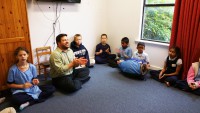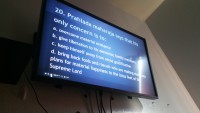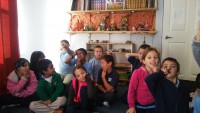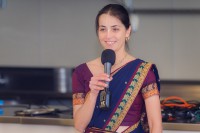
A small team is making a big difference to holy places in India. Renovating holy sites, and feeding widows and children, this film was created to increase awareness of their efforts. A video by Prananath Das.
Websites from the ISKCON Universe

While it may be turning up a little late, the BBT Africa’s recently released 2014 report shows encouraging growth in outreach – especially for a branch of the Bhaktivedanta Book Trust established just five years ago to better deliver Prabhupada’s books to the African Continent. “The continent has recorded amongst its best book distribution scores ever in 2014,” says managing trustee Govardhana Das.
When we called to invite H.H. Kesava Bharati Das Goswami Maharaja to join us for the Donor Appreciation Dinner, he said it should be “short and sweet” and short and sweet indeed it was. The Sanctuary was beautifully decorated and elegantly arranged. The program began with a lively kirtan, led by all the attending children. Students’ presentations then followed. Children, representing each class, shared their learning and personal experiences at TKG Academy. They beautifully described the highlights of their school-year and their realizations of what gains they have made emotionally, spiritually and academically in the course of their education.
Mother Gopi-gita then emphasized the importance of our Gurukula education and of our donor family. She encouraged each donor to suggest another friend to join our donor base so that we can meet our goals for 2015.
H.G. Nityananda Prabhu stressed the value of the unique opportunity our children are getting in this school and again reiterated the value of our supporters, our donors.
A sumptuous feast was then served by the Upper Elementary students. They also handed each family a flower pot, personally painted and decorated by TKG Academy students, with the inserted sign: “Thank you for helping me grow”.
Answer Podcast
Download by “right-click and save content”
From Abhiram Gopal Prabhu:
In Kunti’s character in video 2 in the Mahabharata Characters Course, in the same video you mentioned how she said that Bhima has mantras to kill the demon in ekachakra in order to hide revealing their identity and then you mentioned she had never spoken untruth and therefore Draupadi had to marry all 5 sons since it came from her mouth.
Answer Podcast
Download by “right-click and save content”
Answer Podcast
Download by “right-click and save content”
Holy Name Meditation Podcast
Download by “right-click and save content”
CC daily Podcast
Download by “right-click and save content”
Bhagavatam-daily Podcast
Download by “right-click and save content”
Some time later those sages began to discuss things, sitting on the bank of Sarasvatī River after having performed their daily rituals and baths. They had noticed that social problems were on the rise. “Maybe,” they said, “by killing the king we’ve left the leaderless people as prey for dangerous criminals?”
Clouds of dust billowed here and there, probably raised by bands of thieves galloping everywhere as they plundered the people. The sages moved to destroy the criminals just as they had destroyed the king, but when they approached they realized that the citizens themselves had become criminal and were plundering each other. The whole populate had become like thieves in the absence of a king’s governance. If they killed the criminals, there would be almost no one left!
“Wise philosophers,” they thought, “see everything as being equal, and therefore remain neutral and uninvolved. But if this neutrality causes them to ignore the needy, their spirituality is lost like water leaking from a cracked pot.
“The flawlessly heroic philosopher-kings of Aṅga’s dynasty are devoted to All-Attractive Keśava. They should not be allowed to disappear.”
To restore Aṅga’s dynasty, the sages rapidly catalyzed the material in the thigh of Vena’s preserved corpse, and created a very small human. His body was black as a crow, with short arms and legs, big jaws, blunt nose, red eyes, and copper-red hair.
He humbly bowed to the sages, asking, “What would you have me do?”
“Niṣīda” they replied, indicating that he should sit, wait, and tolerate his difficult fate. Later this person became known as Niṣāda. His descendants formed the forest-dwelling nomadic mountain-tribes known as Niṣādā. Niṣāda absorbed all the ghastly calamities of Vena. Purifying the corpse.
Then the learned sages catalyzed the material in the arms of the lifeless king and created a couple. The sages were very satisfied because they knew that this couple was an expansion of the All-Attractive. “He is an expansion of All-Attractive Viṣṇu, the sustainer of the world,” they said. “And she is the power of Lakṣmī, who is inseparable from that Supreme Person. We name him Pṛthu, expansive, because his fame as the greatest emperor will expand far and wide among kings. We name her Arci, splendid, because her smile is radiant, and her goddess-qualities outshine the beauty of the most beautiful ornaments. She will be like the sunrise and he will be like the earth. He is directly a fragment of Hari, born to protect the world. And she is certainly his dedicated power, Śrī, taking birth because she is inseparable from him.”
– Translated from Śrīmad Bhāgavatam (4.14.36 ~ 4.15.6)
by Vraja Kishor dās
VrajaKishor.com
New Vrindaban is famous throughout ISKCON as being Srila Prabhupada’s first farm project, named after the holy dhama. Like other farm projects and temples, it was given the nomenclature “New” to link it to its origin. Srila Prabhupada even said there was no difference between the two, Vrindaban and New Vrindaban. The presiding Deities of Radha Vrindaban Chandra, Srinathji and Gaur Nitai are stunning. The larger than life Deities of Lord Nrsimha and Prahlad Maharaja are astounding. Lord Jagannatha, Lord Balarama and Lady Subhadra also have a separate altar, as do the Six Goswamis.
We arrived from Pittsburgh on Wednesday, May 27th in time to honor lunch prasadam at the home of Srila Prabhupada’s disciple Nityodita prabhu and his wife Padma, and were pleased to have Malati prabhu in our midst. Gopisa prabhu and other senior Srila Prabhupada disciples were also present. From there we went to the temple to begin making arrangements for the TOVP presentation that evening.
About 75 devotees assembled for the TOVP presentation. During kirtan there was an abhisheka of the Padukas and Puspanjali, after which the program began with Radha Jivan and Jananivas prabhus speaking about the TOVP project. Many devotees came forward to make pledges, despite this being a farm community. By the end of the pledgeing almost $115,000 was raised.
On Thursday, May 28th Jananivas was given a tour of Prabhupada’s Palace and other places in New Vrindaban. He was very pleased to get an opportunity to come to one of the original temples in the Western world established by Srila Prabhupada.
The post TOVP Daily Tour Diary Days 77-78 – Our Visit to New Vrindaban appeared first on Temple of the Vedic Planetarium.
Sunday Love Feast for All | ||||||||||||||||||
| ||||||||||||||||||
| ||||||||||||||||||
Every morning, TKG Academy students gather to learn about Krishna during sadhana class. For three weeks in the last semester of school, parents were invited to teach the class.
Classes were about Lord Nrisimhadeva’s half-man, half-lion incarnation of Krishna. Archana Mataji was the first to arrive. With her peaceful demeanor, she read the Sri Prahlada story to the students, and asked questions.
 Daru Krishna Prabhu, after encouraging the children to lead the Nrsimha prayers, spoke about the recent massive earthquake in Nepal and the efforts devotees are undergoing to help the thousands of affected families. Connecting how Lord Nrsimha protects his devotees to the current affairs in the world, and inspiring the children to take action is a powerful way to integrate the philosophy of Krishna consciousness in their lives.
Daru Krishna Prabhu, after encouraging the children to lead the Nrsimha prayers, spoke about the recent massive earthquake in Nepal and the efforts devotees are undergoing to help the thousands of affected families. Connecting how Lord Nrsimha protects his devotees to the current affairs in the world, and inspiring the children to take action is a powerful way to integrate the philosophy of Krishna consciousness in their lives.


 Gopi Vallabhi Mataji arrived ready with a Jeopardy style game, testing the student’s prior knowledge on Lord Nrsimhadeva! The children had much fun answering questions in their teams and scoring points. “Prahlad Maharaj says that his only concern is to: a. overcome material existence. b. give liberation to his demoniac friends. c. keep himself away from sense gratification. or d. bring back the fools and rascals who are making elaborate plans for material happiness.” Do you know the answer?
Gopi Vallabhi Mataji arrived ready with a Jeopardy style game, testing the student’s prior knowledge on Lord Nrsimhadeva! The children had much fun answering questions in their teams and scoring points. “Prahlad Maharaj says that his only concern is to: a. overcome material existence. b. give liberation to his demoniac friends. c. keep himself away from sense gratification. or d. bring back the fools and rascals who are making elaborate plans for material happiness.” Do you know the answer?
Now that students learned so many details about the pastime, it was time to study His form. Mother Chitra read a beautiful verse from the Srimad Bhagavatam SB 7.8.19, and proceeded to teach students how to draw Sri Nrsimha’s face. His angry eyes, His razor-sharp teeth, His shining mane, His erect ears and gaping mouth, all perfectly placed in order to instill fear in the hearts of the those who hurt His devotees. Step by step, children drew each feature and worshipped the Lord through the process of archanam.

 Next, the study of mothers, leading up to Mother’s Day. Mother Nrtya Kisori spoke about the importance of respecting women in Vedic culture.
Next, the study of mothers, leading up to Mother’s Day. Mother Nrtya Kisori spoke about the importance of respecting women in Vedic culture.
Mother Ananda Lila read from “Honor Thy Mother”, delineating the 7 mothers in Vedic culture.
The last parent-teacher for the session was Nityananda Chandra Prabhu. He enlivened the class with his beautiful stories about Go-Mata, the sacred Mother Cow. He spoke about Working Villages International, non-profit organization dedicated to building self-sufficient, environmentally sustainable villages. Astotara-Sata, the son of renowned Hare Krishna Dasi, has established an experimental village in the Republic of Congo, where he has shown the importance of Mother Cow for self reliance and sustainable agriculture. His efforts earned him a prestigious TED Fellowship.
We ended the weeks with exuberant Spiritual Friday programs, worshipping Lord Jagannath, Baladeva & Subhadra. Thanks to all the parents who taught the class!

Kirtanparty.com Launches Drive to Increase Street Chanting
The Kirtan Party program isn’t just interested in increasing the quantity of kirtan parties going out, however. It’s also interested in upping the quality.
“The first point is that it should be pure,” Vaisesika says. “The devotees who are singing should be very much dedicated to a life of devotional service. And they should be taking shelter of the Holy Names as they’re singing, knowing that they’re simply broadcasting, but that it’s the power of the Holy Name that’s attractive to people.”
Read the entire article here: http://goo.gl/DSrKwC

Auckland New Zealand: Friday night harinam (Album with photos)
Srila Prabhupada: In the material world everyone is envious of his fellow man. Animalistic envy exists in human society as long as there is no performance of sankirtana-yajna, the chanting of the holy names – Hare Krishna, Hare Krishna, Krishna Krishna, Hare Hare, Hare Rama, Hare Rama, Rama Rama, Hare Hare. (Srimad-Bhagavatam, 4.30.35 Purport)
See them here: https://goo.gl/eAAMBN

Lismore Lantern Festival - 20 June 2015 (Album with 103 photos)
ISKCON New Govardhana - Sri Sri Radha Govardhanadhari
See them here: https://goo.gl/lWtdB0

Harinama Sankirtana in Russia (80 min video)
Srila Prabhupada: Bhaktisiddhanta Sarasvati Thakur sings “My dear mind, what kind of Vaisnava are you? Simply for false prestige and a material reputation you are chanting the Hare Krishna mantra in a solitary place.” In this way people who do not reach are criticized. (Srimad-Bhagavatam, 4.29.1b Purport)
Watch it here: https://goo.gl/5TmfpU

Harinam Stockholm (10 min video)
Srila Prabhupada: In old age, at the time of death, the throat sometimes becomes choked with mucus or blocked by air. At such a time the sound vibration of Hare Krishna may not come out. Thus one may forget Krishna. Of course, those who are strong in Krishna Consciousness cannot possibly forget Krishna at any stage because they are accustomed to chanting the Hare Krishna mantra, especially when there is a signal from death. (Srimad-Bhagavatam, 4.28.15 Purport)
Watch it here: https://goo.gl/byxA6Q

30.06.2015 H.G.Balabhadra Prabhu_SB class in Vrindavan (51 min video)
Cow protection
Watch it here: https://goo.gl/xuxMTg

Preaching program at the Veda Yoga Center (Album with 71 photos)
Srila Prabhupada: If Krishna consciousness is covered by material sins, one can eliminate the sins simply by chanting the Hare Krishna mantra, but if one pollutes his Krishna Consciousness by offending a brahmama or a Vaisnava, such a vaishnava-aparadha cannot be atoned for by any means other than by begging the pardon of the offended Vaisnava. (Srimad-Bhagavatam, 4.26.24 Purport)
See them here: https://goo.gl/yo4dc4

Super high quality professional photos of Vrindavana for printing
Download them for free here: http://goo.gl/kKlu9y

Kavicandra Swami: Some new initiated in Nkawkaw (a town in south Ghana). Please bless them!

July’s Kirtan London newsletter
Dear Kirtan Londoners! Last month in New Delhi, 35,000 people took to the large avenue in front of the presidential palace to practice yoga together in the open air. Similar events were held in Osaka, Beijing, Paris, Seoul and New York. It was all in honour of the United Nations designated ‘International Yoga Day’, designed to promote yoga as a practice that supports physical and spiritual wellbeing, as well as respect for the environment and all living creatures.
We at Kirtan London think it’s a great idea, and following our recent outdoor Festival of Chariots in Trafalgar Square, are hoping that public practice and awareness of yoga in all of its many forms becomes more and more popular.
Read more: http://goo.gl/08rgvp
(English/Turkish)
The post Istanbul questions and answers with guests appeared first on SivaramaSwami.com.

Little Nandi: the highlight of the 24h Kirtan in New Vrindavana! (3 min video)
Watch it here: https://goo.gl/lrAhsi

Travelling Sankirtan party Nitay Gouranga in action (10 min video)
Srila Prabhupada: “The essence of all Vedic knowledge—comprehending the three kinds of Vedic activity, the Vedic hymns, and the processes for satisfying the demigods—is included in the eight syllables Hare Krishna Hare Krishna. This is the reality of all Vedanta. The chanting of the holy name is the only means to cross the ocean of nescience.” (Narada-pancharatra)
Watch it here: https://goo.gl/Sh5uZg
The post Radha Damodara, Skype conference and Varnasrama seminar in Pecs appeared first on SivaramaSwami.com.
On 11 June 2015, Kadamba Kanana Swami presented a lecture at the Chinese Sanga at Reading University, in England. Sadly, no audio recording was captured but here is an elaborate description.
By Bhakta Nandan
Maharaj started off with a quote from social anthropology about the human personality being composed of nature and culture,
Nature is deep within us, whilst culture is something we grew up with. Culture has many functions, it is meant for cultivating certain qualities and avoiding certain qualities. In this way, the world has culture in which humans find shelter and protection. The ancient cultures, including Indian and China, were of a deeper nature with more emphasis on values; whereas the modern cultures are based on, ‘When’s the money coming?’
A few of the Chinese women were nodding their heads, seemingly in agreement, although one could have also considered it as some form of cultural etiquette. Saying that, they were diligently taking notes… more so than probably a lot of devotees do!
Maharaj continued with how he got involved with India forty-five years ago. Then, India was a completely different world from where Maharaj came from but of course, in the modern times, the world is getting very small. Maharaj then pointed to a young European lady in the audience. He mentioned how last week he met this same lady in Australia and now he is here and she is here too! The Chinese women started giggling at this remark. It is interesting how people from different cultures find completely different things funny.
 Anyhow, Maharaj went on to say that now it is normal to chat with someone fifteen thousand miles away, but for all the miracles of technology, we pay a price. We experience this on a social level. Things are getting lost. Traditions are disappearing, little-by-little.
Anyhow, Maharaj went on to say that now it is normal to chat with someone fifteen thousand miles away, but for all the miracles of technology, we pay a price. We experience this on a social level. Things are getting lost. Traditions are disappearing, little-by-little.
Now, China is opening up to the world at large and with that, gradually there will not just be a business relationship with the West, there will be a cultural one as well. Soon, it will merge into one standard and this will be of a thoroughly materialistic nature. With that, there will be emptiness; a global village haunted by a ghost of emptiness. A deeper fulfillment will be missing.
However, Maharaj did reassure the audience that there is a solution to all this – by reconnecting with ancient cultures, it will give us new inspiration. He then gave an example from his own life. He was from Holland which was greatly affected by the war. The mood after the war was all about rebuilding the nation and then the whole focus was on economy and profit. In twenty years, Holland became a successful nation. But by that time, Maharaj’s generation were not just children. They were asking whether it is just about the economy or was there not more to life?
Many groups were coming out, such as the Beatles, who had a song called, “She loves you, yeah, yeah, yeah!” This was the reason the kids bought it. But on the other side, there was a song called, “Money can’t buy you love.” This really made the youth feel connected to an ancient culture. So the point is that we have so many emotions, but the central theme of love in Vedic culture is “give, give, give.” In love, there is greater pleasure in giving than taking.
This spirit of loving and giving is the sublime and topmost element of emotions and the essence of the Vedic culture – bhakti. The root (dhatu) of this word is bhaj which means service, love and worship. So life is not just about economic development. Maharaj pointed out that this is the humanities faculty, “Is it just to get a buck or do we actually want to do something good for humanity?”
Otherwise everyone just cares about themselves and not others. So Vedic literature says that if you want to change the world, then change yourself. The emphasis is on individuals making differences in their character. In humans, we recognize higher and lower natures within. Vedic literature is all about pursuing the higher nature of the individual.
If you just proclaim good values, like the value of honesty, but if no one in the room is honest, what is the point? So we must first cultivate good values. In the long term, this brings out the good results. So we must look at the long term then things will be more balanced.
Maharaj emphasized that we must look at where things come from. Modern society tells us that the oceans and heat together are creating things but it has never been observed that anything ever came to life from something dead.
In Holland, the culture is liberal – so long as you do not talk about religion. However, we must understand somehow that there is a divine being! In India, there is still something. The day after the tsunami, there was a global outcry but that did not break the spirit of the Indians. They were just like, “It is alright. We can deal with it.”
 Maharaj then remembered how he was in Benares where there many beggars. One morning, he saw a dead body lying on the street. Many people were walking passed it and chucking coins. Soon the whole body was covered in coins and Maharaj asked why. One of the locals mentioned it was to buy wood to burn the body. This it was to help the soul not come back to that body again. In Vedic culture, the body is burned because the soul still wants to get back into the body. Bodies are yantras or machines. We are actually not this body. That is the essential truth. The soul is constantly changing according to consciousness. Noting the Chinese crowd, Maharaj added how it is the same in Buddhism; after all it came from India. So bodily consciousness determines what we become.
Maharaj then remembered how he was in Benares where there many beggars. One morning, he saw a dead body lying on the street. Many people were walking passed it and chucking coins. Soon the whole body was covered in coins and Maharaj asked why. One of the locals mentioned it was to buy wood to burn the body. This it was to help the soul not come back to that body again. In Vedic culture, the body is burned because the soul still wants to get back into the body. Bodies are yantras or machines. We are actually not this body. That is the essential truth. The soul is constantly changing according to consciousness. Noting the Chinese crowd, Maharaj added how it is the same in Buddhism; after all it came from India. So bodily consciousness determines what we become.
One time a Professor introduced Maharaj as a reincarnationist. Maharaj emphasized that he is not a reincarnationist. It is a risky business. We do not know where we will end up. So as long as we want to control and possess (in a mocking German accent), “This is mine! That is mine! This is mine!” Then hate, lust, greed always comes back to us. “Here is my lovely baby. The neighbour’s baby – go away. Korean child – bad. Chinese child – good!”
A saint can embrace the whole world, by going for higher values. For example, they put Mandela in prison for twenty seven years but he came out without any hate! How do we reach this? Through meditation? However, it is very difficult to focus the mind. We are spiritual beings connected to each other and are meant to serve, love and worship; and that is the best way to attain that state of consciousness.
Throughout the whole talk, one could barely hear a pin drop from the Chinese ladies, but as soon as Maharaj mentioned that it was time for questions, a whole host of hands went up and a very lively and animated discussion ensued. One of the ladies asked Maharaj, “What, in your opinion, is the meaning of being human?”
Maharaj firstly asserted that his opinion is the Vedic culture, which he puts faith in. Without principles, humans are like animals. But humans can have the element of spirituality to recognize the Lord and help in the elevation of all. That is human, otherwise it is anti-human. If you do not have spiritual goals, then you are like an animal!
Another lady asked, “Why is it that people are still miserable despite rising standards of living?”
Maharaj replied that there are people who are exploiting; the profit just stays with the bosses. For example, recently in a magazine on the plane, it was revealed that Suharto of Indonesia had amassed a whopping fifty-nine billion dollars for himself that was meant for the citizens of his nation. These things are to be expected. Lust, greed, anger become the predominant qualities so we need to go for higher qualities.
The same lady then asked, “How does one restore oneself to the good side?”
Maharaj explained that this is done by long term vision. If we act for the evil side, we may get immediate benefit. We must act in reference to the long term benefit through education and training. We can choose the good option again and again. If our long term vision is strong, then we are able to say no.
The questions kept coming, one after another. It was fascinating to see how these Chinese women had transformed from the dour, sober group during the talk to really going for it and inquiring as much as possible about the ins-and-outs of Maharaj’s discussion.
The last two questions to Maharaj are particularly worth mentioning. One of the ladies asked Maharaj, “How do you get the strength to do this?”
Maharaj responded quite simply that if you are in a group that commits to a goal, then you can do it – like giving up smoking. Of course, in the initial stage, some level of determination is definitely required as well. Maharaj went on to say that after the war, his uncle and father were enjoying the fruits of their hard work. There were four boys, including cousins, and he was chosen as the leader because he had a brain for these things. However, he saw that his father was not happy and was always working so he told him he did not want to work in the company. As expected, his father became livid and threatened that he would not give him a single cent. That is when Maharaj knew that he did not need it. His father then realized that he had no control over his son. Maharaj left for India at age seventeen, with the belief that he also had enough energy to make his own money, but his mother ended up giving him money anyway! (Laughter from audience) Maharaj explained how his father had a textiles factory and daily he saw so much wool coming in to be made into carpets and yet there was so much blood on the wool. Why? What is going on? His father also taught him how to the read the wine chart so he could wine and dine. So this was the culture that Maharaj was brought up in.
At the end of the class, the final question to Maharaj was rather funny. One of the ladies asked why did Maharaj have a Chinese surname.
It goes without saying that this question did bring forth a few chuckles from those assembled. For those of you who don’t know, Maharaj’s birth surname is Kok. Maharaj said how he was in Canada at the time of the SARS virus so his name came up on the computer. The airport official looked at the name and was a little perplexed. Here was Maharaj, by all accounts having very North European features but with a dhoti andchadar and a name like Kok. Somehow, the official concluded this gentleman must be in Chinese and so they kept him in custody! (Further laughter)
Maharaj then finally clarified that Kok is also a Dutch surname meaning ‘to cook’. The Chinese lady then responded by saying that Kok in Chinese is related to castles. Maharaj then thought for a while and with a grin stated that he preferred the Chinese definition for his name! The Chinese ladies then all laughed in appreciation.
Maharaj then finished off with a sweet melodic, low-key kirtan – just right for the mood and audience.
HG Bada Haridas Prabhu Singing in Sadhu Sanga Retreat 2015 on Day 2 HD Video
The post Daily Darshan – July 2nd, 2015 appeared first on Mayapur.com.
Friends, if I argue with you, I argue with you.
Please don’t wear the plastic armor that by arguing with you I am arguing with Prabhupāda. It should be pretty obvious how wildly pompus that attitude is.
Yes, you are a devotee, an ISKCON member, a disciple of Prabhupāda or of Prabhupāda’s disciple, etc. but this doesn’t make you identical with Prabhupāda, nor does it mean that you understand Prabhupāda perfectly (or less). I understand that you have your opinion of what Prabhupāda teaches, wants, etc. I respect that as your opinion. Please have the presence of mind and meekness of ego to recognize that other people besides yourself can have different opinions of what Prabhupāda teaches, wants, etc.
A person with a different understanding of Prabhupāda is not automatically any of the following catchphrases: blooped, a fringie, a speculator, unchaste, independent, a puffed up scholar, or a self-appointed ācārya. What they are is just a person with an understanding of Prabhupāda that is different from yours.
Maybe their understanding is better, closer to the divine truth. Maybe its worse, further from the essence. Figure that out by discussing it rationally, please – not by claiming that, since it’s not how you see things, its completely wrong and anti-Prabhupāda.
I understand that you hang out with lots of people who have the same understanding of Prabhupāda as you do. I understand that there is a feeling of strength in numbers. But please don’t think that simply because a lot of people believe something, it is true. If there are a lot of very deep, very intelligent, very sincere people who come to the same conclusion about Prabhupāda that is important. But 95% percent of the time the strength in numbers is just might-makes-right by the size of the herd. Just because a person with a half-baked idea was the best person at the time to assume a position of power and prominence, and now has lots of people without the inclination or ability to scrutinize or question his or her concept of “Prabhupāda says” or “Prabhupāda wants,” it doesn’t make his concept of Prabhupāda any more or less half-baked than whatever it actually is by virtue of whatever it actually IS.
I understand that being a “Prabhupāda Disciple” feels like a passport to the V.I.P. section of heaven, and implies that you are right about your opinion of what Prabhupāda said. But unfortunately 98% of the Prabhupāda Disciples spent as much time studying personally from Śrīla Prabhupāda as you or I have – zero. They all percieved Prabhupāda through their own intellectual and emotional lenses (just like you and I), or, worse, through the intellectual and emotional lenses artificially imposed on them by their bhakta leaders, temple commanders, and so on and so forth.
The fact that you are socially senior means that you deserve social respect – it doesn’t mean you comprehend philosophy better or worse than anyone else. Maybe you do comprehend it better. If you do, its because you comprehend it better – not because you have a certificate, or a rubber stamp, or a letter from Prabhupāda changing your name to something in Sanskrit.
So, please, what I am saying is, if I am arguing with your idea of something, I am arguing with your idea of it. The fact that you think it is also Prabhupāda’s idea is part of your argument, that’s all. Defend the idea please, or don’t engage in a debate or proselytize it.
If you don’t know the basic principles of how to debate a topic rationally, how analysis of statements can be made (“hermeneutics” / “exegesis” or mimaṁsa), or the hierarchy of importance in assessing evidence (“epistemology” or pramāna), it would be much better for you (for your sake, too) to stop blogging, stop posting, stop commenting, and start listening and studying under a teacher who does.
Thank you, please forgive my frustration. Hare Krishna.
Vraja Kishor dās
Bhagavatam-daily Podcast
Download by “right-click and save content”